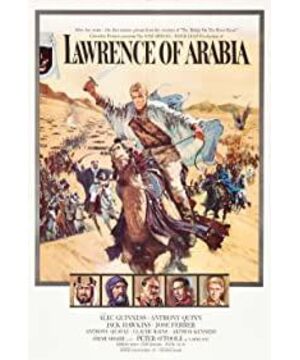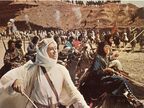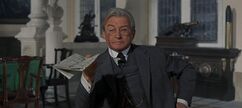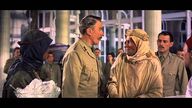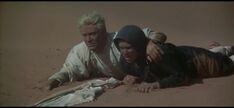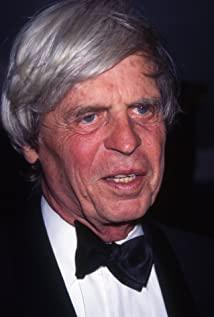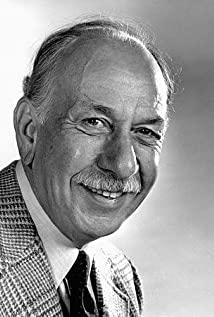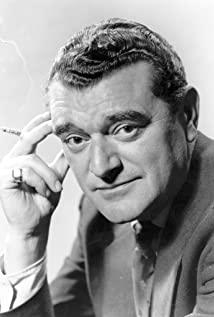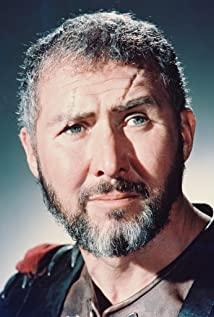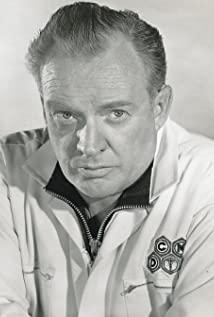Lawrence is such a difficult person to understand. When he talks to his superiors with an almost joking attitude, his cynicism is out of line with the army, and his career in the army seems to be obvious at a glance. Suddenly there was such an "opportunity" to send him to contact Prince Feather of Arabia. This may be because the superior despised him, but we know the ending, so we can say that it was an "opportunity".
In the desert, he was riding a camel, and his movements were a bit exaggerated. It felt like a reflection of his inner psychology. He seemed to have returned to a familiar place, and he could control the camel with ease. Insisting on not drinking, this Lawrence seems to be a little different from himself, but when I think about it carefully, he can also endure when he plays the game of fire, the sir and our audience did not find out that this cynical guy has an inner energy earlier, excavated in the desert.
When he and Ali argued that Nothing is written, he had to be awe-inspiring. There was always an indescribable almost crazy persistence and firmness in his eyes, which may have come from his superior family conditions and growing environment since he was a child. It comes from his pride and confidence that he is multilingual, but also from a Christian's knowledge of the world. (Actually, I'm not sure if he is a Christian.) He succeeded, single-handedly rescued Qasim from the desert hinterland, earned the respect of Ali and his people, and earned his place among the Arabs. It was fate that made him, and it was his character that made his own destiny. As for persuading Oda to attack Akaba together, he was good at verbal debate. Furthermore, he was full of confidence at the time, everything seemed to be done naturally, and there seemed to be nothing that could not be done. He even brought two personal entourages back to Cairo and obtained Arms, military supplies, and support from the London army. During this time Lawrenc's head rose with a halo, and the Arabs almost thought of him as a saint, and he elevated himself inwardly to the status of Jesus Christ. Qasim's theft caused a conflict between Ali and Oda. For the sake of peace, Lawrence sadly ended Qasim's life; one of his entourage was swallowed by quicksand on the way to Cairo, causing his guilt ; The only remaining follower was injured when bombing the railway. In order to prevent him from falling into the hands of the Turks, Lawrence did not hesitate to solve him. At that time, he could no longer see sadness or guilt from his expression. You can only think that he has a big right in his heart - the independence of the Arab nation, he has a clear goal, and he can decisively sacrifice personal justice for this. None of these losses could cover the halo on his head. Until he was captured in Deraa, in a frenzy of swagger, he was provoked, molested, insulted, and the film implicitly skipped over him being benched and beaten to the point of being beaten by the Turks The process of throwing it into the snow. Ali prayed for him while waiting outside the door, and ran up once he was thrown out. Lawrence turned his head immediately and buried his face in the snow.
What he experienced terrified him, made him decline from the peak, and made him re-acquaint himself as a mortal. In order to survive in the world, he went to the general to ask for a stable and safe job. The Lawrence is back, "Leave me alone!" Some of Lawrence's performances are both unprofessional and too effeminate, a 1962 film that the director may be using to time his sexuality.
However, he is a complex of contradictions. As soon as he hears that the independence of the Arab nation he is fighting for is going to be ruined, Lawrence rekindles the fighting spirit that has just been extinguished, and he and the general bet on who can reach Damascus ahead of time. This time, he is more determined, cruel and more strategic. First, he hired professional killers to protect his personal safety. Second, he still issued the order of "kill without amnesty" when the Turkish army was retreating. He even killed Ali. are all afraid. They succeeded in first occupying important places in Damascus and convening a parliament. How could he have expected that the Arab national independent state he had been fighting for would fall apart when the first parliament was held. All Arabs may not pursue the establishment of an independent and independent state at all, Just grab some gold bars and cattle and sheep for New Years. And his most successful thing is that he influenced Ali, he transformed from barbarism and cruelty, and was determined to stay in Damascus to study politics.
At this point in the story, Lawrence's glory and fall have almost been completed. His life is fascinating, turning over history and surprising people. This is just a story based on certain deeds of historical figures. The director and screenwriter created it. Reverse the order of history, fictional colonel Ali, Dryden, Brighton, weaken the role and achievements of the people around him in the war, and expand Lawrence's personality charm and personality tragedy. Lawrence is buried in St. Paul's Cathedral, and also stands in the hearts of audiences because of the movie. The movie is also epic.
Regardless, Lawrence's struggle for Turkish independence is real, and it's a puzzling mystery. A foreigner from thousands of miles away, what force can make him so loyal to the struggle for Arab independence and fight for it. Is it an ideal inspired simply because one is admired? Obviously it doesn't make sense.
There is information that Lawrence knew an Arab young man and had a close relationship with him when he was working at the Kachemes archaeological site. When Lawrence returned to England, he brought him back to live with him. Dahome died of typhus in 1917. Lawrence later said in "Seven pillars of wisdom" that his dream - to win political freedom for the Arab people - was meant to be a gift to Dahom. The following is a speech from the book, as well as a poem for Arab youth:
TO SA
I love you, so I drew these tides of man into my hands
and worte my will acorss the sky in stars
To earn you freedom, the seven pillared worthy house,
that your eyes might be shining for me
When we came.
Death seemed my servant on the rouad, till we were near
and saw you waiting:
When you smiled, and in sorrowful envy he outran me
and took you apart:
Into his quietness.
Love, the way-weary, groped to your body, our brief wage
ours for the moment
Before earth's soft hand explored your shape, and the blind
worms grew fat upon
Your substance.
Men prayed me that I set our work, the inviolate house,
as a memory of you.
But for fit monument I shattered it, unfinished: and now
The little things creep out to patch themsevels hovels
in the marred shadow
Of your gift.
translation
A speech dedicated to SA (.
I love you, so I'm pulling this stream of people into my hands
Write my wish in the starry sky
To win your freedom - the house of wisdom with seven pillars
Your eyes will shine for me
when we come
Death seems to be my servant on the journey until we come to you
see you waiting
He catches up to me when you smile, sadly jealous
and pull you away
into his speechless silence
Love is a tiring journey, in order to seek you, give our little reward
all we have
When the soft hand of the earth touches your body, when this blind worm
Before gaining weight, rely on
your flesh
People are begging me to start work and make this inviolable house
as a memorial to you
But to make it a monument, I destroyed it before it was done
These little detritus are built up into a hut
in your gift
in the shadow of destruction
View more about Lawrence of Arabia reviews


